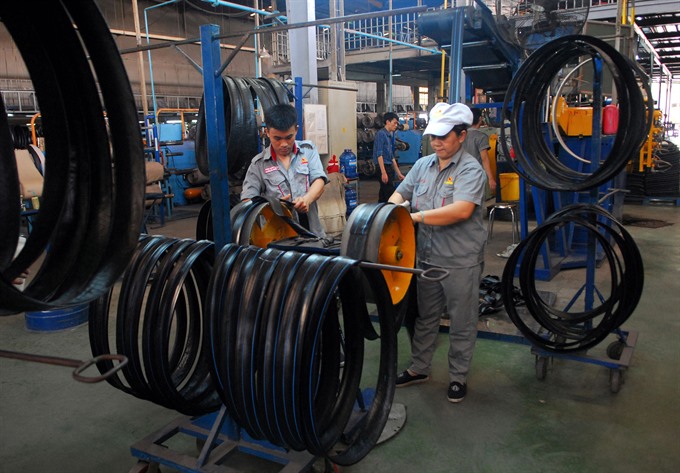
[4 January 2017] — In a new move, the Government has announced the rate of State-ownership in firms that are set to be equitised, instead of fixing the rates by sectors as usual. It has also issued a list of 103 State-owned enterprises (SOEs) in which the State will hold a 100 per cent stake and another 137 that will be equitised in the 2016-20 period.

Among those that are to be equitised, the State will hold over 65 per cent of the charter capital in four, and 50-65 per cent in 27, and below 50 per cent in 106 SOEs. The State will retain full ownership in SOEs operating in sectors like national defence and security, nuclear power and money printing.
The new lists and other provisions are contained in Decision No 58 issued on the very last day of 2016 to replace the Decision No 37/2014/QĐ-TTg dated June 18, 2014, and will take effect on February 15 this year.
Đặng Quyết Tiến, deputy director of the Ministry of Finance’s Corporate Finance Department, welcomed the decision saying that it proves the Government’s determination to improve transparency and effectiveness of equitisation process. Tiến said publicising names of the equitised companies with specific rates of State ownership would help avoid enterprises’ petitions for maintaining a higher rate of State ownership as had previously happened.
Previously, the Government had only regulated the extent of State ownership rates by sector, not specific SOEs, leading to low divestment, Tiến said. He said that the average divestment rate at SOEs is now 8 per cent, meaning that the State still holds 92 per cent of the firms’ charter capital after equitisation.
SOEs are not willing to equitise because of leaders’ fears that they will be unemployed if controlling stakes fall in private hands, according to Tiến.
Besides, due to poor preparations for equitisation, private investors are not provided with enough information, and many stakes languish “on the shelves”. To ensure that the equitisation process benefits both the State and private investors, the Government would require better information disclosure by the SOEs and might lift the cap on the number of strategic shareholders so as to increase the number of bidders, Tiến said.
Tiến also said that the Government would not rush to sell its stake at one time. Instead, the divestment would be divided into many phases, depending on the market situation. “I think the Vietnamese market is still small, so if we don’t have policies to attract foreign capital, it is difficult for us to reach the SOE equitisation targets,” he said.
The Steering Committee for Enterprise Renovation and Development reported on December 28 that the Government had sold stakes in 55 enterprises in 2016, bringing the number of SOEs equitised in the 2011-16 period to 554. The 55 equitised enterprises were under the management of the ministries of National Defence, Industry and Trade, and Agriculture and Rural Development; the Việt Nam Rubber Group; and the Việt Nam Southern Food Corporation.
As of now, the State has sold shares worth more than VNĐ4.493 trillion (US$199.69 million) in book value for more than VNĐ7.098 trillion ($315.46 million). — VNS
 AEC boons yet to show (20/11/2016)
AEC boons yet to show (20/11/2016)
 Second Doi Moi Needed: Scholars (11/10/2016)
Second Doi Moi Needed: Scholars (11/10/2016)
 Divestment from SOEs fall short of targets (14/09/2016)
Divestment from SOEs fall short of targets (14/09/2016)
 Pollution threat for VN marine life (22/08/2016)
Pollution threat for VN marine life (22/08/2016)
 SME law must meet business expectations (16/07/2016)
SME law must meet business expectations (16/07/2016)
 Vietnam Drafting up SME Law (21/06/2016)
Vietnam Drafting up SME Law (21/06/2016)
 Gov't Resolution to Protect Firms’ Rights (06/05/2016)
Gov't Resolution to Protect Firms’ Rights (06/05/2016)
 SOEs struggle to find strategic partners (08/04/2016)
SOEs struggle to find strategic partners (08/04/2016)
 VN firms urged to focus on branding (12/03/2016)
VN firms urged to focus on branding (12/03/2016)
 VN targets high growth to 2020 (04/02/2016)
VN targets high growth to 2020 (04/02/2016)